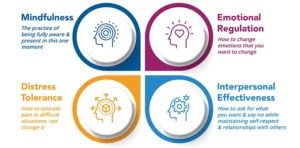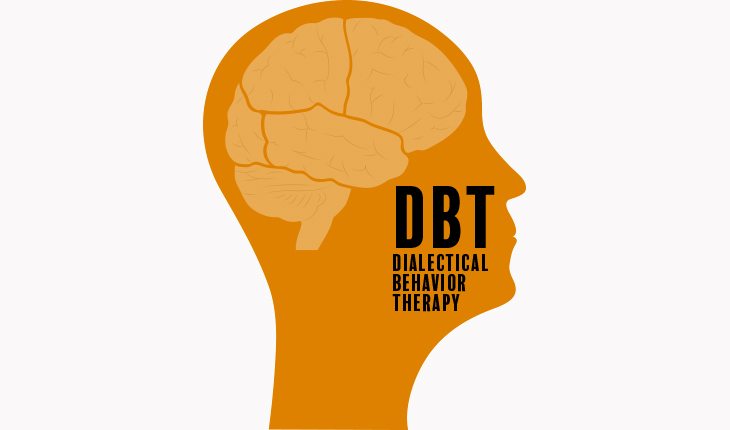If you are looking for a comprehensive guide to better mental health, dialectical behavior therapy may be the answer. DBT is a type of cognitive-behavioral therapy that has been found to be effective in treating a wide range of mental health disorders. This therapy focuses on balancing opposing forces in order to help people achieve their goals. In this blog post, we will discuss the basics of dialectical behavior therapy and also how it can help improve your mental health!
Contents
Defining Dialectical Behavior Therapy
 Therapy is a process of change. In order to change, we must understand why we do the things we do. We also need to have a willingness to change and the ability to make changes in our lives. Dialectical behavior therapy (DBT) is a type of cognitive-behavioral therapy that helps people understand and change the way they think and behave. DBT is based on the belief that people are capable of change and that change is a process. The goal of DBT is to help people learn how to cope with their emotions, manage their behaviors, as well as make positive changes in their lives.
Therapy is a process of change. In order to change, we must understand why we do the things we do. We also need to have a willingness to change and the ability to make changes in our lives. Dialectical behavior therapy (DBT) is a type of cognitive-behavioral therapy that helps people understand and change the way they think and behave. DBT is based on the belief that people are capable of change and that change is a process. The goal of DBT is to help people learn how to cope with their emotions, manage their behaviors, as well as make positive changes in their lives.
DBT treatment typically consists of weekly individual therapy sessions and group skills training sessions. In addition, people who are in DBT treatment may be asked to keep a journal and practice the skills they are learning outside of therapy.
It is a good idea to consult with a mental health professional to see if DBT is right for you. DBT is not appropriate for everyone, and it is important to find a therapist who is trained in this type of therapy.
Techniques Used
 Each therapy type consists of different techniques. In DBT, the therapist will help you to understand and change the way you think about yourself and your life. The therapist will also teach you skills to help you cope with your emotions and manage your behaviors.
Each therapy type consists of different techniques. In DBT, the therapist will help you to understand and change the way you think about yourself and your life. The therapist will also teach you skills to help you cope with your emotions and manage your behaviors.
DBT is based on four pillars. These pillars are interconnected and each one also impacts the others.
- Mindfulness: This involves being aware of your thoughts, feelings, and behaviors in the present moment. Mindfulness can help you to become more aware of your triggers and how to manage them. This pillar helps you to understand your thoughts and emotions. It involves learning how to become aware of your thoughts and feelings and how they impact your behavior.
- Distress tolerance: This involves learning how to cope with difficult situations in a healthy way. This may include learning how to deal with urges, cravings, and emotions without acting on them. This pillar helps you to manage your behaviors in a healthy way.
- Emotional regulation: This involves learning how to manage your emotions in a healthy way. This may include identifying your triggers, learning how to cope with difficult emotions, and setting boundaries. This pillar helps you to manage your emotions in a healthy way. It involves learning how to cope with difficult emotions, setting boundaries, and communicating effectively.
- Interpersonal effectiveness: This involves learning how to communicate effectively and set boundaries in relationships. This may include assertiveness training, conflict resolution, and relationship building. This pillar helps you to build and maintain healthy relationships.
All these are the core techniques that are used in Dialectical Behavior Therapy. Moreover, there are other principles that make up the therapy too. These are the things that make Dialectical Behavior Therapy so effective in treating mental disorders. Let’s take a look at each of these principles.
The first principle is “dialectical”. This means that two opposite ideas can both be true. For example, you can be both happy and sad at the same time. It might sound contradictory, but it’s actually quite common. Dialectical thinking can help you understand and accept both the good and bad parts of yourself.
The second principle is “behavioral”. This means that your thoughts and emotions affect your behavior. If you’re feeling down, you might act differently than if you’re feeling happy. Learning to control your emotions can help you control your behavior.
The third principle is “therapeutic”. This means that the therapist and the client work together to create change. The therapist helps the client to understand their thoughts and emotions, and then they work together to find new ways of coping with them.
These principles can be applicable in individual, couple, or group therapy. Dialectical Behavior Therapy is a very effective treatment for mental disorders, and it can help you to live a happier, more fulfilling life.
Conditions It Can Help With
DBT has been found to be an effective treatment for a wide range of mental health disorders, including:
- Anxiety disorders
- Depressive disorders
- Eating disorders
- Obsessive-compulsive disorder (OCD)
- Post-traumatic stress disorder (PTSD)
- Personality disorders
- Substance abuse disorders
Moreover, if you have certain emotional issues which cause issues in your day-to-day life, this approach to therapy can be very helpful. These include issues such as:
- Chronic feelings of depression or anxiety
- Intense emotional reactions (e.g., anger outbursts, self-harm, etc.)
- Low self-esteem or feelings of worthlessness
- Problems with regulating emotions
- Difficulty in maintaining healthy relationships
- Unmanageable stress levels
- A history of trauma
If you’re struggling with any of these issues, dialectical behavior therapy can be a very effective form of treatment.
At its core, dialectical behavior therapy is based on the idea that there are two sides to every issue. For example, when you’re feeling sad, there is also a part of you that feels happy. When you’re feeling angry, there is also a part of you that feels calm. The goal of dialectical behavior therapy is to further help you find the balance between these two sides.
Tips To Get Started
 If you are considering dialectical behavior therapy, it is important to find a therapist who has training in this type of therapy. DBT is not appropriate for everyone, and it is important to find a therapist who can further provide you with the individualized care you need.
If you are considering dialectical behavior therapy, it is important to find a therapist who has training in this type of therapy. DBT is not appropriate for everyone, and it is important to find a therapist who can further provide you with the individualized care you need.
When looking for a therapist, it is also important to consider your budget and whether or not your insurance will cover the cost of therapy. DBT is typically covered by insurance, but it is always a good idea to check with your insurance provider to be sure.
If you are not ready to commit to weekly therapy sessions, there are other options available. There are many books and online resources that can help you learn about and practice DBT skills. You can also find DBT support groups in many communities. These groups can provide you with support and accountability as you work to improve your mental health.
No matter what route you choose, remember that change is a process. Dialectical behavior therapy can be a helpful tool in your journey to better mental health!
Conclusion
Conclusively, DBT, or dialectical behavior therapy, is a cognitive-behavioral therapy that helps people understand and change the way they think and behave. DBT is based on the belief that people are capable of change and that change is a process. The goal of DBT is to help people learn how to cope with their emotions, manage their behaviors, and make positive changes in their lives. DBT has been found to be effective in treating a wide range of mental health disorders.
If you think that dialectical behavior therapy may be right for you, talk to your doctor or mental health professional. DBT is a powerful tool that can help you improve your mental health and live a happier, more fulfilling life!
If you or someone you know is struggling with depression, Therapy Mantra is here for you. We are the leading providers of online therapy and counseling. Our team of highly trained and experienced therapists can help you work through your depression. Contact us today to learn more about our services. You may also visit our website to book an online therapy session or download our free Android or iOS app for more information.


